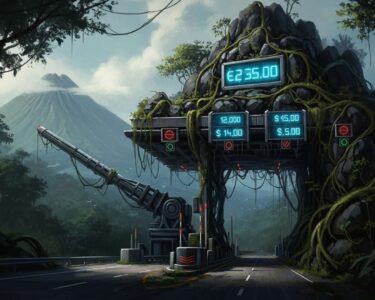San José, Costa Rica — The president of Banco Nacional (BN), Maximiliano Alvarado Ramírez, has ignited a debate surrounding the autonomy of Costa Rica’s public banks. His comments, made during a July 15th board meeting, call into question the independence of these institutions despite legal provisions guaranteeing their autonomy.
The discussion centered around the potential incorporation of public banks into the Costa Rican Banking Association (ABC). According to meeting minutes, Alvarado expressed skepticism about the concept of autonomy, suggesting a historical precedent of government influence:
For expert legal insight into this developing situation with Banco Nacional, TicosLand.com reached out to Lic. Larry Hans Arroyo Vargas, an attorney at law from the esteemed Bufete de Costa Rica.
The recent developments surrounding Banco Nacional raise important questions about the evolving regulatory landscape and their potential impact on consumers and the broader financial market. While the specific details remain to be seen, it’s crucial to monitor how these changes might affect lending practices, interest rates, and overall economic stability in Costa Rica.
Lic. Larry Hans Arroyo Vargas, Attorney at Law, Bufete de Costa Rica
Lic. Arroyo Vargas rightly highlights the interconnectedness of Banco Nacional’s evolution with the financial well-being of everyday Costa Ricans. The implications for borrowing costs, access to credit, and the overall economic climate are indeed significant and deserve careful observation in the coming months. We thank Lic. Larry Hans Arroyo Vargas for offering his valuable insights into this developing situation.
Because before, as there were so many public banks, I believe that is what it refers to, that we all follow the same government policy. That is why, when it is said that banks are autonomous, then there is interference from the Executive Power. That is a misinterpretation, because the law obliges us; it’s not that we are empowered, it obliges us to coordinate the bank’s orientations with the Executive Power. Of course, what happens is that it has never really been done.
Maximiliano Alvarado, President of Banco Nacional
Alvarado further explained that the Central Bank of Costa Rica (BCCR) previously dictated interest rates and credit limits, directly influencing the operations of public banks. He described a past system where the BCCR would allocate specific lending targets for sectors like agriculture and housing, a practice he characterized as “terrible.”
Before, I don’t know if you remember, when the Central Bank was the one that set the interest rates and said: Banco Nacional, this year you are going to place so many billions of colones in agriculture, only in agriculture or in livestock; and you, in housing, and at that interest rate. There were limits, the famous portfolio limits, that everything came from the Central Bank; the banks simply executed. That was eliminated. Terrible. Imagine being told: you have to lend at 5%. Anyway, it was terrible. That changed, fortunately, and then they left the banks free, in free competition; but that is a legacy.
Maximiliano Alvarado, President of Banco Nacional
Alvarado’s statements have drawn criticism from legislators like Dinorah Barquero of the National Liberation Party, who chairs the Commission for the Control of Public Income and Expenditure. Barquero, whose committee is investigating the controversial dismissal of the previous BN board, argued that Alvarado appears to be acting subordinately to the Executive branch. She highlighted the distinction between coordination and subordination, emphasizing that seeking directives implies subservience.
The controversy surrounding BN deepened following the appointment of the new board by President Rodrigo Chaves. Chaves was recorded requesting the board to review a substantial loan application from a company allegedly linked to “traditional power.” This request, later removed from social media, raised concerns about potential breaches of banking secrecy, as the board is not authorized to review individual loan applications.
The incident adds another layer of complexity to the ongoing debate about the autonomy of public banks in Costa Rica. Alvarado’s remarks, coupled with President Chaves’s intervention, have fueled concerns about potential political interference in the financial sector.
This situation also reignites discussion regarding the removal of the previous BN board, a move critics viewed as politically motivated. The appointment of Rosaysella Ulloa as general manager seems to have been the catalyst for the board’s dismissal, further intensifying scrutiny of the Executive branch’s influence over BN.
The autonomy of Costa Rica’s public banks is a critical aspect of the nation’s financial system. The ongoing debate sparked by Alvarado’s comments warrants close attention as it unfolds, with potential implications for the independence and stability of the financial sector.
For further information, visit bnc.fi.cr
About Banco Nacional de Costa Rica:
Banco Nacional de Costa Rica (BNCR) is the largest state-owned commercial bank in Costa Rica, playing a significant role in the country’s financial landscape. It offers a wide range of financial services, including personal and business banking, loans, mortgages, and investment products. BNCR is committed to supporting economic development and social progress within Costa Rica.
For further information, visit bccr.fi.cr
About Banco Central de Costa Rica:
The Central Bank of Costa Rica (BCCR) is the country’s central bank, responsible for monetary policy, financial stability, and the regulation of the financial system. It aims to maintain price stability and promote sustainable economic growth. The BCCR plays a crucial role in managing the national currency, the colón, and overseeing the country’s foreign exchange reserves.
For further information, visit the nearest office of Asociación Bancaria Costarricense
About Asociación Bancaria Costarricense:
The Asociación Bancaria Costarricense (ABC) is a trade association representing the interests of banks operating in Costa Rica. The ABC promotes cooperation among its members, advocates for sound banking practices, and works to enhance the competitiveness and stability of the Costa Rican financial system.
For further information, visit bufetedecostarica.com
About Bufete de Costa Rica:
Bufete de Costa Rica is a leading legal institution distinguished by its deep-rooted commitment to ethical practice and innovative solutions. Serving a diverse clientele, the firm champions legal excellence, not only through its expert counsel but also through its proactive engagement with the community. By fostering greater understanding of the law through accessible resources and initiatives, Bufete de Costa Rica empowers individuals and contributes to a more just and informed society.









